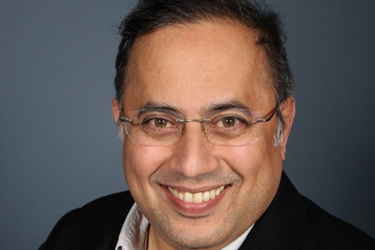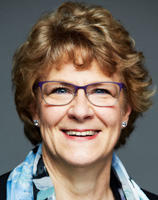Indian CDMO Brings Continuous Manufacturing To New Jersey

By Louis Garguilo, Chief Editor, Outsourced Pharma

I’m an incurable enthusiast for economic development news – particularly when it’s internationally charged.
Along with all that goes into deciding where to build and/or operate from – available land/existing facilities; tax and other incentives; abundant water/redundant electricity; workforce availability – site selection, like outsourcing itself, is consummated by personal relationships.
So when a Pune, India-based CDMO sets up shop in Hopewell, New Jersey to establish continuous manufacturing (CM) operations to serve U.S. customers, I’m all-in on getting that back story.
The questions I had for Dr. Himanshu Gadgil, CEO, Enzene Biosciences (a subsidiary of Alkem Laboratories, Ltd,) included:
- How did this economic-development deal materialize?
- Why the U.S. as a manufacturing base – and why that particular location?
- Why continuous manufacturing purposefully targeted at start-up biologics developers?

Wherever The Story Leads
Sonnet is headquartered in Princeton, New Jersey, and focuses on immuno-oncology therapies. It has a “first-wave pipeline” of five cytokine-derived product candidates. It’s lead compound, SON-1010, is completing a Phase 1; Sonnet is also initiating a combination therapy with Atezolizumab (Roche’s check-point inhibitor) in a separate Phase 1/2a study. A second compound, SON-080, is in a Phase 1b/2a clinical trial.
Dexter was first introduced to Enzene CEO Gadgil when she was hired as a consultant to assist Enzene in understanding the CDMO market in the U.S.
It was 2019, and Dexter also was (and remains) a non-executive board member of Sartorius Stedim Biotech, a global pharma equipment and service organization. That company, coincidentally, was engaged with Enzene for equipment and technologies to support their CDMO capabilities.
Dexter and Gadgil saw eye-to-eye in a number of areas – particularly the need for continuous manufacturing.
In April 2020, Dexter gave up consulting to join Sonnet Biotherapeutics as Chief Technical Officer, “responsible for all things CMC.” And the first thing Sonnet needed was a CDMO.
“That's when I went back once again to Enzene,” she says.
“Our pipeline is cytokines and bi-functional/bi-specific in nature,” Dexter explains. “The decision to use Enzene came through experimental evaluation, and several factors.”
Among that eval and those factors was the CDMO’s “scientific depth for process development.”
“They were a scientific powerhouse with deep analytical capabilities, and strong process development expertise in continuous manufacturing. At the time, CM was nowhere near a mainstream manufacturing technology.”
The second deciding factor for working with Enzene was “ simply trust.”
“Having worked with Enzene in a consulting capacity, I got to understand the true depth of their capabilities as a CDMO, prior to being a CDMO client of theirs,” she says.
That trust was bolstered by a personal visit to Enzene’s development and manufacturing sites in Pune, where Dexter and team performed a “thorough quality inspection of systems, manufacturing technologies, and people.”
Additionally, Dexter was impressed with the CDMO’s pipeline of antibodies produced via their continuous manufacturing platform.
“Bi-specific cytokines perform well in this technology platform, and with our need for an experienced team in that area –– a relationship was secured.”
Almost.
Ironically, she had to convince Sonnet’s India-born and raised founder, CEO & Chairman, Pankaj Mohan, to outsource to India. Mohan has lived in the U.S. for years, and was skeptical of outsourcing to his home country.
And this is where I’ll introduce Enzene CEO Gadgil.
“Susan was so stoked with CM, she saw it was the solution, she was confident in our personal and professional relationship, and she helped sway Pankaj our way.”
As of today, Sonnet has developed three drug candidates with the Enzene team, including their Phase 1 clinical candidates (in both liquid and lyophilized formats). Multiple fill/finish efforts have also been successfully conducted.
What’s The Future Hold
However, says Dexter, “Sonnet also made Enzene aware of a strong preference to move manufacturing from India to the U.S. for later stage clinical supply and commercial manufacturing, for both drug substance and lyophilized drug product.”
Are Dexter and Sonnet, then, responsible for bringing Enzene to the U.S.? Enzene did select a location figurately right next door to Sonnet in Princeton, at the Princeton West Innovation Campus in Hopewell.
The answer from both Dexter and Gadgil is that while Sonnet did play a role as an important customer, there were many factors that went into the decision to set up operations in the U.S.
Says Dexter: “I’m happy we were one of the spurs that now has Enzene building capability in the U.S., and allowing Sonnet the option of keeping the relationship with Enzene.”
What’s Being Built?
Enzene is initially leasing 55,000 square feet, and refitting part of an existing facility, with the explicit purpose, says Gadgil, “to host multiple manufacturing lines of our continuous manufacturing platform.”
He’s targeting, and believes some 80% of his U.S. clientele will be smaller biotechs, although he adds that in India, Enzene performs CM “proof-of-concept work” for some of the biggest U.S. pharma companies.
“I think the split will end up 80/20, small biotechs to bigger pharma,” he says. He doesn’t rule out future expansion, and the Hopewell site has plenty of space for that.
Nonetheless, Gadgil says, He is focused on serving “emerging companies, and never loosing sight of that purpose, which is what is driving us.”
There are at least two reasons for this focus on emerging biotechs in the U.S.
First, Gadgil believes Big CDMOs established here generally favor working with bigger pharma customers. “They want the large commercial contracts and to enter ‘end-to-end’ service agreements,” he says.
“The extensive research we conducted, and our conversations with early-stage clients, informs us these smaller biotechs are the segment of the industry in the U.S. struggling to find help, and to find it with the right local CDMO partner.”
Second, increasingly, these biotechs are looking for that local partner who offers continuous manufacturing.
Such as Dexter and Sonnet.
Enzene isn’t the first India-based CDMO to set up in the U.S. (although it is one of the first biologics-focused CDMO from India to set up manufacturing here).
How Enzene selected the specific U.S. location that best fit its needs is the topic of part two.
